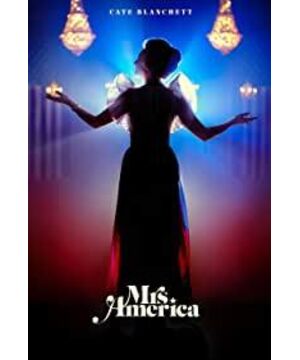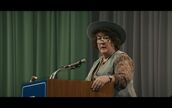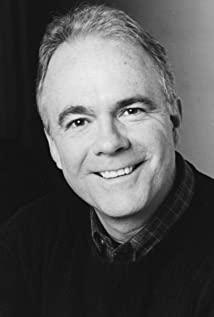EP01
Members of the New York Radical Women (NYRW) protest in New Jersey for that year's Miss America election in 1968. They threw lipstick, high-heeled shoes, underwear, and Playboy magazines into the Freedom Trash Can outside the venue, resisting the patriarchal society's use of "beautiful" standards to put shackles on women. This landmark event of the second feminist movement also led directly to the definition many people have of feminists: ugly, lonely, pathetic old maids.
The heroine, Phyllis, said she never felt discriminated against and attributed her dissatisfaction and failure to their own lack of effort. And what kind of life does she live? She has a beautiful face (consistent with mainstream aesthetics), a perfect figure, a beautiful education, a smart mind, and a husband who can expand her contacts and provide funds for her entry into politics, and the family has enough financial means to hire a nanny to take care of the children. She relieves the burden of housework. In the existing social structure, she has exhausted the sweetness of the gender dividend. If she wants to continue to win, she can only cling to, rely on, and praise patriarchy more closely and help stabilize such a system to make it stand.
Phyllis's speech to housewives addresses their inner fears. They don't have the education and resources like Phyllis, and if the existing male breadwinner model is destroyed, they don't even have the ability to obtain financial resources. They do not have a role model, the unknowns brought about by change are disturbing, and women enter the labor market with more than courage and enthusiasm. And this happens to be ignored by radical feminists—isn't it still the case today, wanting to get married? You are an accomplice to patriarchy. Want to give birth? You are the slave of the womb. "Mrs. America" is about a debate that has persisted since the beginning of the feminist movement: liberals and conservatives find each other pathetic. One marriage, several children. Patriarchy is what cuts women's sisterhood apart.
EP02
Gloria made a cameo appearance as herself in Season 6 of The Good Wife. When Alicia hesitated to run for state attorney, Gloria encouraged her backstage in a speech that was quite decisive. Read Gloria's memoir, "On the Road." Gloria said that "journey" was chosen as the book's theme because "until now, travel has been overwhelmingly masculine territory. "Men represent adventure, while women represent the stove and the home."She writes about her experiences in India, the practice of the feminist movement, and the story of her encounters from a feminist perspective. An Irish driver once turned to Gloria and her friend while waiting for a traffic light: "Honey, if men could get pregnant, abortion would be a sacrament!" (a sacrament)" later became a slogan in the movement. This is also mentioned in the play.
The second episode showed not only the division between liberals and conservatives but also the divisions within the same camp. Among the liberals, some people think that the housewives should be united, while others think that they should take a clear stand against them. This point still emphasizes the importance of intersectionality feminism—within the same group, everyone has different demands. The last point is the stance that social movements, including the feminist movement now under way, should have the patience to bake bread and make phone calls.
EP03
Focus on Shirley Chisholm, the first black woman to enter Congress (1968) and the first to try to win her party's presidential nomination (1972). Her autobiography is titled Unbossed and Unbought: not led, not bought. Shirley's life creed is also vividly displayed in EP03. Women must speak on their own behalf. They can't hope for small favors from male politicians, and they can't be satisfied with gentle transactions.
She rose to prominence in college debates and was advised by professors to enter politics, saying she faced a "double handicap," the double handicap of being black and being a woman, after working in education for more than a decade. only officially entered the political battlefield. As feminists raised their arms and chanted sisterhood, minority women's voices submerged.
In 1989, law professor Kimberlé Crenshaw proposed "intersectionality" and "black feminism" in the book. Advocating the rights of black women cannot be discussed only from the perspective of "black people" or only "women". The double discrimination of gender and race is not a simple superposition, but a compound effect. When white women called for a united front, what happened to black women was defined as a secondary issue.
In her epistolary novel "The Color Purple," black female author Alice Walker mentioned that if a woman made public the sexism she suffered in the black community, she would be considered a "class betrayal." In her other novel, Possessing the Secret of Joy, about female circumcision in Africa, she mentioned that women in developed countries are very sensitive to class issues in their own countries, but when looking at the differences between the North and the South in international society, it is slightly more obvious. which is exactly the limit of the white middle-class female-led feminist movement. Other noteworthy issues in EP3 include:
Should the struggle be thorough or roundabout? Should you work with men or break with them? Should appropriate compromise be encouraged or spurned? The importance of voting rights A revolution is not a dinner party or a parade in the streets shouting some pretty slogans. EP03 continues to show the solidarity and cleverness of conservatives.
EP04
Focus on Betty Friedan, author of The Feminine Mystique, and co-founder and first president of NOW (National Organization for Women). The Feminine Mystique is one of the important works of the second feminist movement. The book discusses how, in the 1950s, post-war American housewives, despite their material abundance, felt depressed and lonely. They turned to psychiatrists, but were unable to accurately describe their emotions, a phenomenon known as "malaise". Friedan explained the causes of the problem from the perspectives of the post-World War II historical background, the rise of consumerism, and the promotion of education and the media, and expounded the serious consequences. It is suggested that the only way for women to get out of this predicament is to seek a career that satisfies their own development.
Now it seems that these statements are not new in gender theory, but as other members of NOW in EP04 commented on Friedan: "We were trapped in the wilderness for forty years, and she lit the match."
But Friedan also has her limitations. The episode in EP04 where she forbids her daughter to wear low-cut clothes also shows that she takes a rather conservative attitude towards sexual issues. She wrote in "The Feminine Mystique" that popularizing the feminine mystique would intensify female sexuality, making it "greedy, sensational, and unbridled," and that pornography would become more blatantly vulgar. In addition, Friedan has been criticized for being aggressive against gays and lesbians, calling the growing trend of lesbians the "Purple Menace," firing a gay editor in 1969 (a landmark event in the history of the LGBT movement, the "Stonewall Movement" happened in 1969.), and in 1970, trying to organize NOW members to reveal their gay identities, believing that this would have a negative impact on the advancement of the feminist movement.
?Other noteworthy issues in EP04 include:
The complexity of the relationship between the feminist movement and the lesbian movement (which can still be felt in today's surrogacy discussion) Some feminists deliberately distance themselves from the lesbian community in order to combat the discourse in society that "feminists are all gays". The parody and pursuit of masculinity by some lesbians has led some feminists to accuse lesbian culture of emphasizing essentialism and binary opposition.
The importance of decentralization in the feminist movement I also wrote before that the reason why I dislike civet cats and crocodile hair is that they define many issues of feminism uniquely. Among the female population in the United States, the characteristics of both liberals and conservatives can be clearly seen. Although the liberals also have key figures, there are obviously more people who have the right to speak, and the discussions appear to be more equal. The conservative side is basically Phyllis's dictatorship, and it also pretends to give her a chance, but this so-called cooperation is based on her personal desire for power.
EP05
Phyllis's paradox Her actions against the ERA are based on maintaining the family system in which the male is in the house and the female is in the house. However, when she stepped into the political arena, became famous in the media, and controlled her husband and children, she could not hide her ambitions. That's why she's full of holes in the debate between the two couples. Binary traditional values do not stand up to scrutiny. As for the young couple on the opposite side, Marc Fasteau is the perfect boyfriend in the hearts of feminists! A good relationship is defined by being open and equal.
However, they divorced in 1987. In 2000, Brenda wrote an autobiography called Not One of the Boys: Living Life as a Radical Feminist (as Marc said in Figure 3, living a radical life), and in 2008, Brenda and her same-sex partner Joanne Parrentgots married. (Being found to be gay as a NOW member in the early 1970s would have had a detrimental effect on the feminist movement, soBrenda'sa at the time was to some extent a personal sacrifice for the collective ideal.) There is also an Easter egg in this episode. Ginsburg, who has not yet become a justice, said, "I don't like to be in the limelight," and laughed!
EP06
A spotlight on Jill Ruckelshaus, a moderate Republican who was active in the feminist movement within the party. Jill also fought back when the GOP no longer supported the ERA. In July 1980, at the Republican National Convention in Detroit, Jill led more than 4,000 ERA supporters in a live protest. As shown in the show, Jill excels at lobbying and speaking, and in 1991, at the National Women's Political Coalition (NWPC) 20th anniversary convention, she reviewed the history of the women's movement. "We've shown people what the power of women, united over one transcendent idea, can be. Yes, we can put aside partisan differences. We can put aside the things that would divide a political party into a thousand different factions. " Yes, we can let go of partisanship. We've shown people the power of women.
Episode 6 is still debating whether to make a certain level of compromise for the "greater purpose." The female White House secretary has accused her superiors of sexual harassment, but feminists do need the votes of those Democrats to move the ERA forward to better institutionally improve the situation of women. Today's hard-won; too many women make personal sacrifices for it. (Including Jill saying she had to put up with other politicians many times.)
EP07
A Spotlight on Bella Abzug: One of the most influential female politicians of the 20th century was a graduate of Columbia Law School. She gave impassioned speeches in subway stations as a teenager and has been an active political activist throughout her life. Gorgeous clothing and brightly colored wide-brimmed hats are her hallmarks, and it's not just about fashion. As Bella once said, "When I was a young lawyer, I would go to people's offices and they would always say," Sit here. We'll wait for the lawyer.' Working women wore hats. It was the only way they would take you seriously. After a while, I started to like them. When I got to Congress, they made a big deal out of it. So I was watching. Did they want me to wear it or not? They didn't want me to wear it , so I did. " Put the hat on and they'll take you seriously.
In EP07, through a quarrel between Bella and Lily, the awkward position of homosexuality in the feminist movement was once again shown. Bella has repeatedly offered to compromise for the long term, which has also left the lesbian community feeling betrayed. To this day, we can still see a confrontation between radical feminist and lesbian groups in discussions about surrogacy on the Internet.
EP08
In this very interesting episode, Macray, who has always been a marionette in Phyllis's hands, is the protagonist. She never thought she would have such a night-drinking with women from the opposite camp, singing with a group of lesbians, listening to feminism participants discuss issues. She screamed, she was baptized, she gave up her everyday graceful gestures, she forgot about the exact recipes in the kitchen, free from Phyllis' control and oppression. What EP08 shows us is the joy of exploration. The scenery on the other side is not really as bad as imagined. At the end, everyone at the conference sang together: we will eventually overcome all this; we have nothing to fear; we will not be divided and defeated again. Impressive.
View more about Mrs. America reviews











